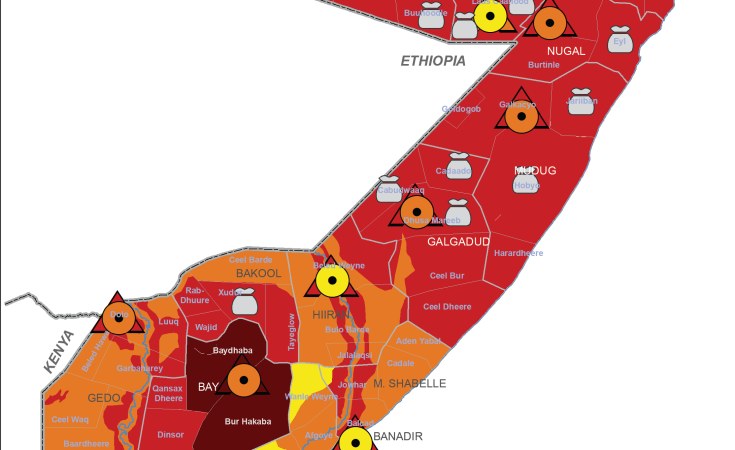If nothing is done within days, people in Somalia will start dying, according to the Red Cross. Experts say that lessons from previous famines have to be learned to prevent mass casualties.
A humanitarian catastrophe is imminent in Somalia and the Horn of Africa. That's the joint assessment of the International Committee of the Red Cross (ICRC) and the International Federation of Red Cross and Red Crescent Societies (IFRC), following months of food security assessments.
The number of people in dire need of emergency humanitarian assistance in Somalia has increased from 4.1 million at the beginning of 2022 to 7.1 million, and is expected to continue to grow.
Francesco Rocca, president of the IFRC, highlighted at a press conference in Geneva that 22 million people living in the Horn of Africa are already in the clutches of a growing food crisis.
"The situation expected to deteriorate into 2023," Rocca stressed, adding that what is being done was "minimal compared to the huge needs" of the region.
Peter Maurer, the outgoing president of the ICRC, meanwhile warned that if the international community waits to take action until a famine is officially declared, "we know that it will already be too late."
"Tens of thousands of people will already have died by the time we declare a famine," Maurer said.
The Horn of Africa is currently witnessing its fifth consecutive failed rainy season. The war in Ukraine and its ensuing grain delivery shortages have further compounded the situation, as well as political upheaval across the region.
More than 200,000 are at risk of dying -- potentially by the end of the year. About half of the country's population is likely to experience hunger and want in some shape during the same timescale unless aid is stepped up.
Uncertain future for children
The UN Under-Secretary-General for Humanitarian Affairs and Emergency Relief Coordinator Martin Griffiths said that in Somalia alone, more than $1 billion (€1 billion) is needed to prevent the worst from happening.
Arriving in the Somalian capital Mogadishu last week, Griffiths underlined the fact that children are particularly at risk, saying that he had encountered children who were so malnourished that they could barely speak.
The number of children facing the effects of severe acute malnutrition in Somalia meanwhile has increased to over half a million, according to the UN. James Elder, spokesman for the UN children's agency UNICEF, said that this level of child famine had not been seen in any country yet this century, with more than 700 children already having lost their lives this year due to malnutrition.
Meanwhile, outbreaks of infectious diseases have also increased in Somalia, with around 8,400 suspected cases of cholera and nearly 13,000 suspected cases of measles.
"We've got more than half a million children facing preventable death. It's a pending nightmare," Elder stated, echoing Maurer's sentiments who said that children potentially dying of hunger "is the result of systemic failure."
In 2011, tens of thousands of children were reported to have died during the most recent famine in the region. The total number of famine victims that year are estimated to be roughly a quarter of a million lives, according to the UN.
Ukraine war -- in Somalia
The war in Ukraine -- unfolding some 7,000 kilometers (4,350 miles) north of Mogadishu -- might be the single biggest accelerator in the current food crisis situation. Prior to the Russian invasion, Somalia imported 90% of its wheat from Ukraine and Russia.
Ukrainian President Volodymyr Zelensky has said he would continue to prioritize the Horn of Africa in whatever shipments can occur in the future while the war still rages, but there are no absolute guarantees, especially since all exports take place under the watchful eye of the Russian military.
Lessons from the past
But there are other factors at play. Somalia's population is for the most part pastoral and nomadic, making it difficult to deliver aid where it is needed most.
However, Rocca stressed that the IFRC is working closely not only with other agencies but also with Somalia's nomadic communities. Rocca said that "world leaders should listen to act immediately" in order not only to prevent a massive humanitarian crisis but also to establish "longterm solutions in the Horn of Africa."
In addition to repeated drought decimating herds and crops, a locust invasion has also contributed to weakening the Horn of Africa since 2019. These are all primarily attributed to the effects of climate change.
The consequences of COVID-19 have also made the situation in Somalia more precarious for many, with supply chains being interrupted at the height of the pandemic.
Years of Islamist insurgency under the al-Shabab militant group in various parts of the country have also contributed to the lack of stability in Somalia and its neighbors, causing irregular migration patterns and displacing thousands from their homes.
Abubakar Dahir Osman, the UN's permanent representative in Somalia, however, emphasized that humanitarian aid alone cannot provide a lasting solution to the famine in Somalia. He said that the relationship between humanitarian aid and development needed to be strengthened to find sustainable solutions for those who are suffering.
Rocca meanwhile stressed that the international community must learn from the shortcomings of the past, adding that addressing "the root causes of the crisis" needed to be part of a comprehensive action plan. Maurer agreed with that assessment, saying that people could start dying "within days."
"The alarm bells are ringing loudly," Maurer added.
Mohd Awal Balarabe, Sylvia Mwehoyi and Mohammed Odowa contributed to this report
Edited by: Keith Walker


